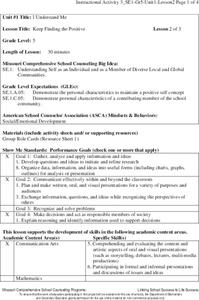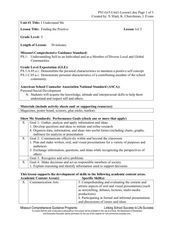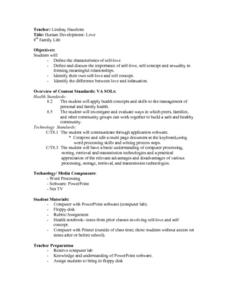Museum of Tolerance
Influence of Media
We are bombarded with media images expressly designed to influence viewers. Learning how to analyze the intended effects of these images is essential and the focus of an activity that asks viewers to use the provided questions to guide...
Curated OER
Communication, Day 3: Asking What You Want
Mild to moderately disabled secondary young scholars practice asking for what they want. They discuss a scenario, list things they want, then practice asking for those things. Our special needs students need to know how to...
Curated OER
HIV/AIDS & Other STDs, Day 1: Germs & Risk
Assist your secondary special education class for understanding risky behavior, hygiene, and STDs. The class discusses how germs spread, how people get sick, and what needs to be done to prevent the spread of communicable diseases. They...
Museum of Tolerance
Music Evokes Memories and Emotions
Dim the lights, take a deep breath, and press play to explore the emotions and memories that music elicits. Class members begin using relaxation techniques designed to create a positive listening experience. As music plays, learners...
Curated OER
Communication, Day 2: Assertiveness
Having social skills and being able to assert yourself in a positive way is so important. High schoolers with mild to moderate disabilities engage in a series of activities to practice assertive communication and social skills. Perfect...
Kentucky Educational Television
What Is Honesty?
This is an absolute must-have resource for exploring honesty with your learners! Youngsters role play four scenarios that involve honest and dishonest actions, and then engage in meaningful discussion and activities regarding those...
Curated OER
Student Opinion: When Did You Have a Great Conversation?
Conduct a classroom conversation about communication using this resource as a jumping-off point. For this The Learning Network activity, learners read an excerpt from The New York Times opinion piece, "The Flight From Conversation," and...
Museum of Tolerance
Quilt Activity
After completing the first five lessons from the series, scholars assemble their quilt pieces to create a family history quilt. They then rate their experience of learning about their families by conducting interviews, creating family...
Missouri Department of Elementary
Finding the Positive
To instill the importance of a positive classroom community small groups create a collage out of magazine clippings that highlight three characteristics of self-awareness. Written examples accompany the finished product. Groups turn in...
Missouri Department of Elementary
Keep Finding the Positive
Group members take on roles to create a positive classroom community. Learners perform their role—leader, recorder, presenter, timekeeper, encourager, and collector—in preparation for a formal presentation of their positive thinking...
Curated OER
To Live or Die While Protecting the Ones You Love
Upper graders retrieve and verify information on life insurance policies through internet research. They discuss how life insurance policies work and make decisions as to what type of policy is best. They produce a timeline and define...
Curated OER
Promoting Academic Success
Students apply basic time management skills to their lifestyle and implement study skills. Also, they should be able to implement management techniques in their daily lives as well. Students list activities and assignments and determine...
Curated OER
Finding the Positive
Fifth graders meet the "Famous Artist." They are introduced to the topic of self-concept. Students work in small groups and get organized to create collages. They create a collage that represents characteristics of positive self-concept.
Curated OER
Extended Families
Students examine the various combinations that contemporary extended families take on. They identify how strong communication skills are important to the health of the family after reading a an excerpt from a first-person fictional journal.
Curated OER
Human Development- Love
Students investigate the concept of self-love. They determine the meaning and develop an understanding of their own status of self-concept. Class discussion is used to encourage deeper research.
Common Sense Media
Common Sense Media: Connecting With Digital Audiences
Code-switching is the action of changing your language, behavior, or appearance based on who you're with or where you are. In this lesson, students will apply the idea of code-switching to how they use phones and other devices in and...
Common Sense Media
Common Sense Media: We Are Civil Communicators
When we talk about our personal beliefs and politics, passions can run high -- especially when we're online. These intense moments can often lead to tit-for-tat insults, or worse. But, if addressed calmly and coolly, they can be an...
Common Sense Media
Common Sense Media: Education: Lesson: My Online Community: K 2
Young scholars explore the concept that people can connect with one another through the Internet. They understand how the ability for people to communicate online can unite a community. Free membership required.
Common Sense Media
Common Sense Media: Lesson: Sending Email: K 2 Grade
Young scholars explore how they can use email to communicate with real people within their schools, families, and communities. Requires free membership.
Common Sense Media
Common Sense Media: Education: Lesson: Show Respect Online (K 2)
Students explore the similarities and differences between in-person and online communications, and then learn how to write clear and respectful emails. Requires free membership.
REMC Association of Michigan
Remc Association of Michigan: 21 Things4 Students: 17. Creative Communications
Communication involves listening and speaking as well as reading and writing clearly and creatively, and technology provides opportunities for expressing yourself digitally. In these Quests, students learn about different software...
Media Smarts
Media Smarts: Lesson: Representing Ourselves Online
In this lesson, learners talk about dressing up and taking on identities that are similar to or different from them. They are then introduced to the idea of avatars as a kind of "dressing up" inside video games and consider the ways in...
Ducksters
Ducksters: Kids Science: Electronic Communications
Kid's learn about the science behind Electronic Communications. How does it work and where did it come from?
REMC Association of Michigan
Remc Association of Michigan: 21 Things4 Students: 14. Social Networking
A social network is an online community of people who use a website or app to communicate with each other by sharing comments, images, videos, resources, etc. This tutorial consists of four quests and, when you have completed it, you...

















